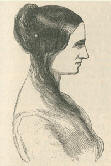|
Amidst the economic depression, Hiram and Mary Gove moved to Lynn, Massachusetts, which supported one Quaker congregation. The salary Mary earned doing needlework and teaching supported the family and Hiram "meticulously unburdened her of every penny she earned." She opened a school for girls but Hiram "did not make the work easy. Mary could not buy books or supplies for her students without begging each cent from Hiram." [1]Paul M. Angle, By These Words, Rand McNally & Company, New York, 1954, p. 182 (Citation: Shameless)

|